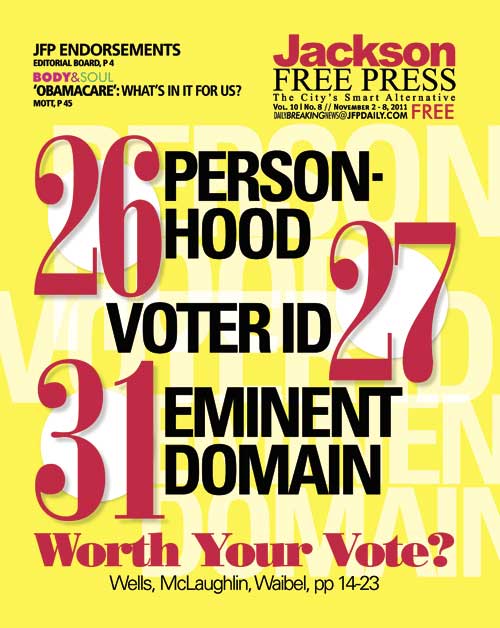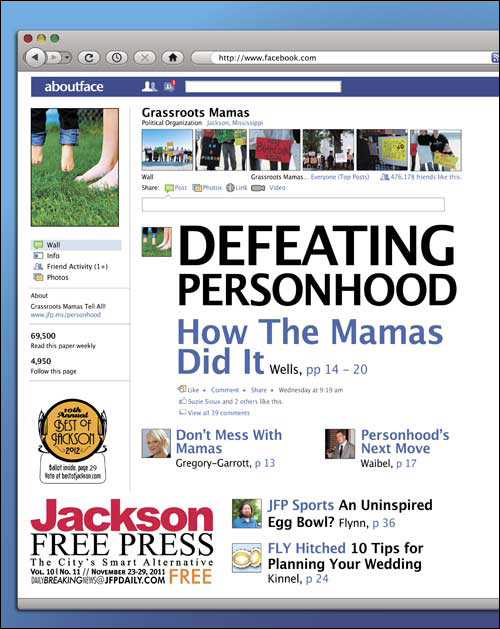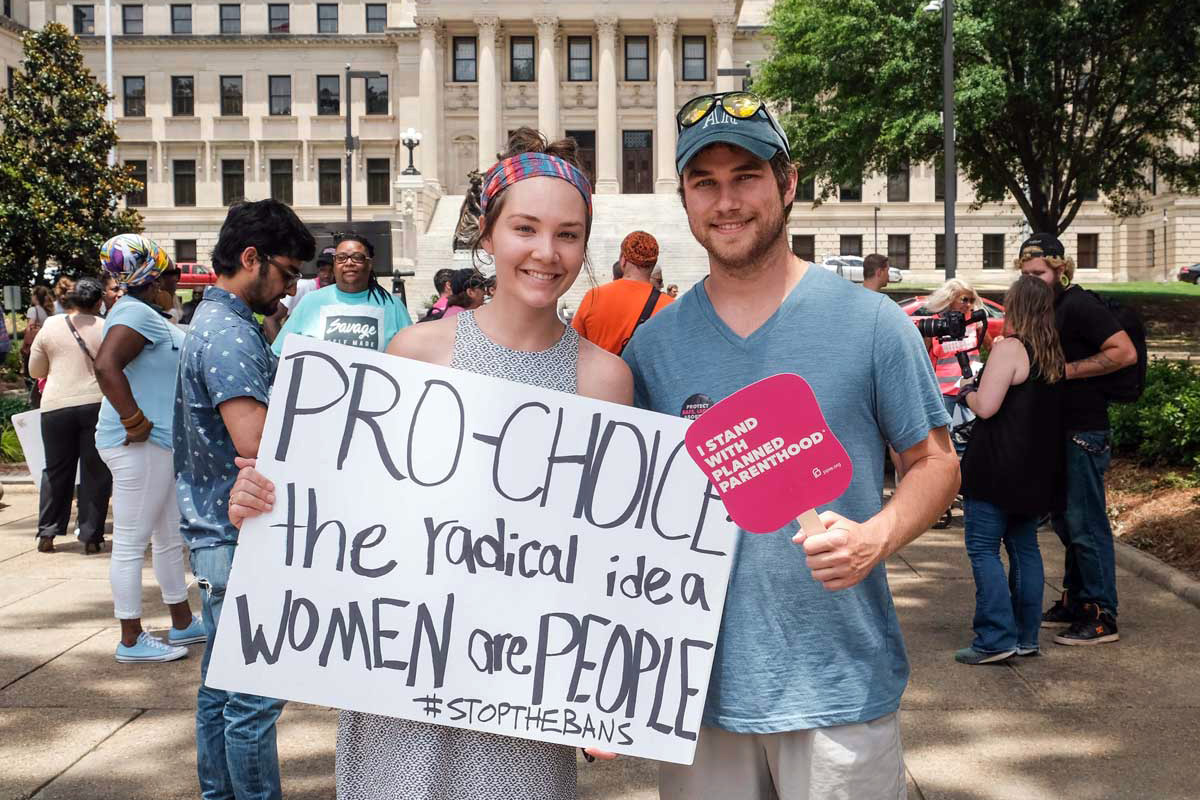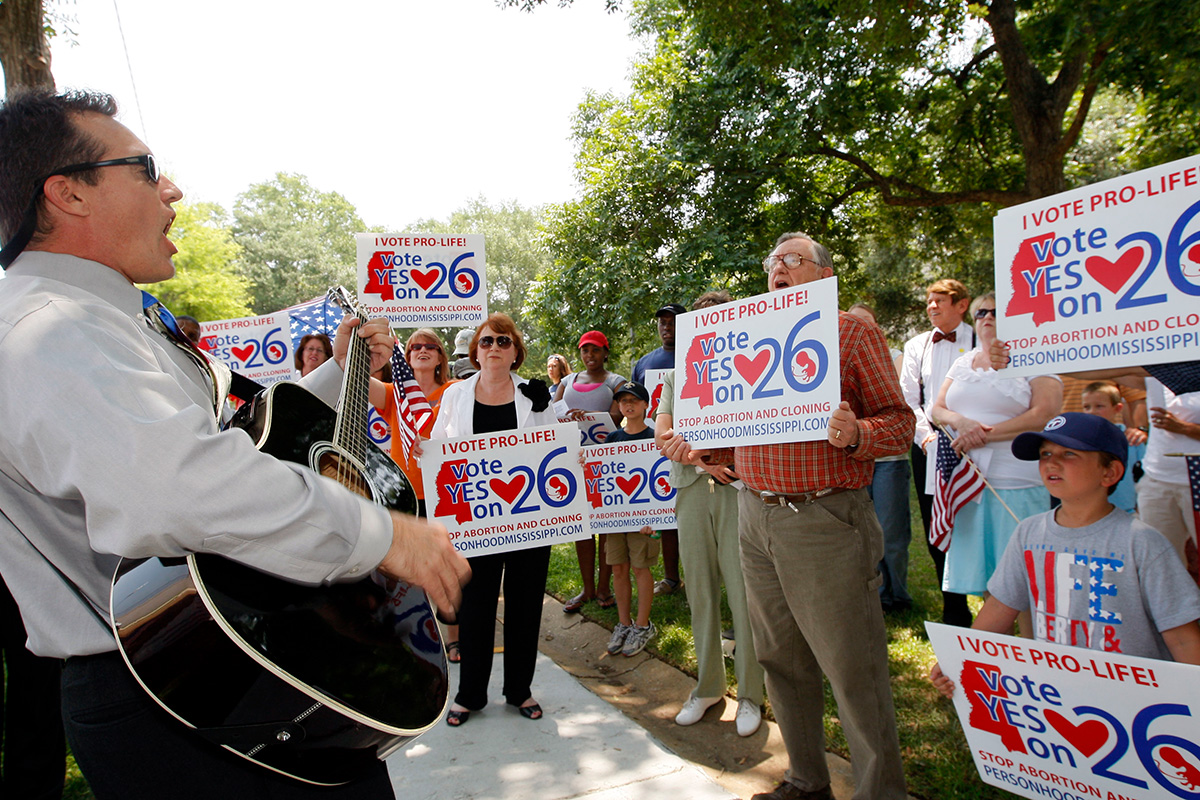On Nov. 8, 2011, I made a noise I had only made once before in my life. Almost two years prior, Garrett Hartley had kicked the winning field goal in overtime to send my New Orleans Saints to the SuperBowl for the first time in the history of the team. The sound was a defeat of 29 years’ worth of being a poverty franchise superfan and a yawp of victory. My victory. That was my team.
Two years later, my team was anyone who could become pregnant, and the stakes were dangerously high—just as they are today. I unintentionally became an anti-Personhood Amendment activist in 2011, and I made that noise again when we won on election night when a majority of Mississippians voted to preserve my rights as a woman.
Now, 11 years later, the fall of Roe v. Wade will bring a total abortion ban to Mississippi, if Attorney Lynn Fitch succeeds before the U.S. Supreme Court. As the “trigger law” established in 2007 stands, the total ban would allow exceptions in the case of rape, if not incest, but Mississippi Sen. Joey Fillingane disagrees. He wants the ban to go so far as to allow only abortions that save the pregnant person’s life.
But Mississippi’s voters already made our beliefs clear at the polls in 2011. Fifty-eight percent of us told the state that our bodies are our freedom, and we want the government out of our lives.
‘What About Ectopic Pregnancies?’
My journey started in 2011 after a mysterious organization introduced a ballot initiative known as Personhood. If successful, it would have made every mention of the word “person” in the Mississippi Constitution include the two-celled organism created at the moment the sperm meets the egg. The moment of fertilization.
The commercial for the Personhood organization seemed promising to me since I was staunchly anti-abortion at the time. I called the number at the end of that commercial and asked “what about ectopic pregnancies?”
“We’re just trying to get the amendment on the ballot. That’ll all get figured out later.”
The brush-off chilled me. I had an ectopic pregnancy in 2004 and, unfortunately, that is not a pregnancy that will survive. It must be terminated, or the mother will die.

My OB/GYN’s office did not carry the methotrexate I would need to end my ectopic pregnancy, but the pharmacy down the road did. My OB held my hand for a long time, and then handed me the prescription when I was ready. I sat in my tiny Sentra calculating how far into the forest I could get so I would die with my baby. Haunted by my staunch early-20s belief that no abortion is ever OK, I started my car.
The pharmacist told me not to cry and that it was going to be OK as he handed me the prescription. My OBGYN put the needle in my thigh, and I spent the weekend with my mom and my husband and some comfort food, watching my baby fall out of me while saving my own life.
Days later, I joined an online support group for others who had experienced ectopic pregnancies, and they had stories that turned me white with terror. Stories of reporting to an ER with pain and being rushed to emergency surgery. Stories of fainting at home and waking up in a hospital room with long scars under their belly buttons, missing a fallopian tube. Some went to hospitals that will not intervene until the tube has burst and the mother is already experiencing internal bleeding, or when the fetus’ heartbeat has stopped.
On happy days we talked about memorial tattoos. On sad days we reported that one of our sisters had died from her third ectopic pregnancy.
Enter the ‘Grassroots Mamas’
When the Personhood representative told me “that’ll all get figured out later,” I thought of those women. All I had needed was a shot and considered myself lucky. How could I trust a legislator to make these decisions for me?
Personhood Mississippi’s Facebook page had all the flowery language of protecting the innocent and loving all of God’s creatures. I emailed twice, asking the same question, never receiving a response. When I asked on their Facebook page, I was blocked from commenting. In 2011, I didn’t know what “gotcha” questions were. I really needed that answer.

I yelled my questions into the darkness until two other women answered. Their stories are theirs to tell, but they had equally vested interests in the effects of such an initiative. We met at Broad Street in Jackson for lunch, and a high-profile lawyer joined us and confirmed our belief that the legal ramifications would be dangerous. Legalese always rattles the locked doors of my brain castle, but I do remember her saying the initiative would be unconstitutional in the end because medical privacy was still protected under Roe.
A growing group of concerned women, many of us mothers, spent what little time we had before the vote—around eight weeks—giving information to people on every branch of the political tree. I knew a lot about anti-abortion attitudes on birth control because I refused to use it myself—it has a tertiary mechanism of preventing implantation. I knew too much about ectopics and talked openly about mine.
We “grassroots mamas” were not activists by any means. We were just women who wanted to warn people.
The wording of the ballot initiative was so simple. It would change the word “person” everywhere in the Mississippi Constitution to be defined as “every human being from the moment of fertilization, cloning or the functional equivalent thereof.” It was clear, and people knew all the facts and made their own decisions.
Without recruitment or incentive, the people of Mississippi became fully aware of the consequences and joined us.
Personhood Backers: Scrambling Under Fire
In response, Personhood advocates scrambled to clarify the unintended consequences of the mess they’d made. They were split all over the place on birth control, on “the life of the mother,” on how in vitro fertilization would be treated.
They called us “outsiders” when they were from Colorado. They said we were from Planned Parenthood, who cheered us on but gave us nothing financial or material. If I drank every time they said we were using “scare tactics,” I’d be dead. The one thing they never did was clarify their policy ideas.

At another grassroots mama’s house on election night, I stood alone in the kitchen and heard Howard Ballou say on WLBT that the vote had been called. Fifty-eight percent of Mississippi’s voters said “no” to Personhood. I released the joy and exhaustion and thrill and pride and anger with the sound I’d only made during the most exciting football game of my life.
We gathered around the kitchen island singing “Not Ready To Make Nice” by The Chicks, popular at the time and our unofficial anthem. Never had I felt more connected to something so important, and never had I felt so convicted in my beliefs.
The abortion stories I’d heard over the past eight weeks were ringing in my head; I had been so myopic for so-long.
Government Intrusion Into Our Bodies
The potential overturn of Roe v. Wade is in a different world than 2011; everyone is looking out for their political team rather than the good of the country. Healthy discourse is a thing of the past. I could not repeat my Personhood fight now. My best hope is presenting you with the facts, showing you contradictions and hoping you have compassion for the gray areas in life.
Here is the verbiage for our “trigger law,” which has been in place since a 2007 bipartisan vote in anticipation of a post-Roe world. Please note the exceptions and understand the many shapes the danger to a mother’s life can take and the many treatments for termination in those cases.
Two Ohio legislators without a medical background thought there was a much easier solution to ectopic pregnancies. In 2019 they introduced a bill that would force doctors to reimplant the fetus into the uterus. Even after significant backlash, he insisted the procedure existed. It does not.
Do you trust a legislator to determine if a pregnancy threatens your or your loved one’s life, or do you trust your doctor?
Most hormonal birth control (including the morning-after pill, or “Plan B”) has the same three mechanisms: prevent ovulation, prevent fertilization and prevent implantation, in that order. Watch these two legislators debate what birth controls would be allowed in post-Roe Louisiana, where life would legally start the moment the sperm meets the egg. This means any birth control preventing implantation would be considered possible abortion—the longtime Personhood position.

Beyond a pregnancy termination, birth control also provides the ability for people to live normal lives with less pain and clearer skin when their bodies don’t act right.
Do you trust a legislator with no medical background to interfere with your birth control? Do you want the specter of a legislator in the room with you after you’ve been assaulted, and you truly want the morning-after pill to prevent any more trauma? Do you trust a legislator with your physical safety at all, or do you trust your doctor?
You may believe you will never need an abortion, nor will you ever get one. I understand that belief, because I once had it. But in the end, how much do you trust your government with your medical choices regarding your body?
Fifty-eight percent of Mississippians said clearly that they did not trust the government in matters concerning their medical decisions. I can only hope that at least 58% remembers the rights that we grassroots mamas fought for—including the right to live—and does what it takes to stop this government intrusion into our bodies, and our rights.
This MFP Voices essay does not necessarily represent the views of the Mississippi Free Press, its staff or board members. To submit an essay for the MFP Voices section, send up to 1,200 words and factcheck information to azia@mississippifreepress.org. We welcome a wide variety of viewpoints.






